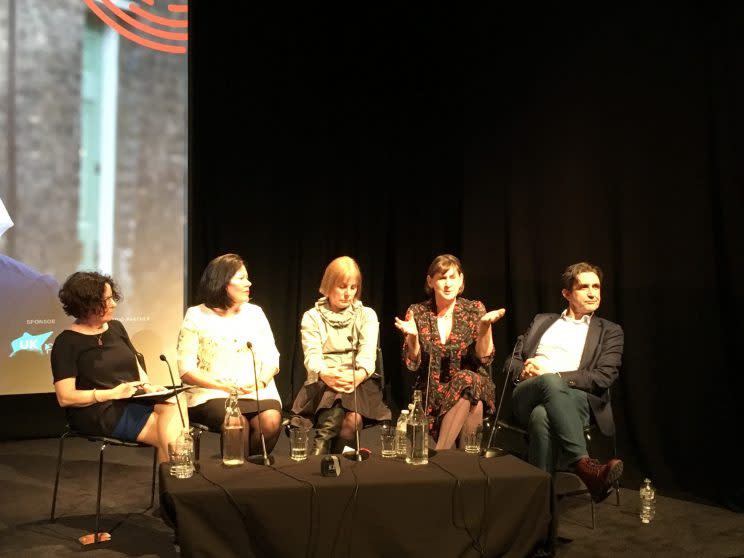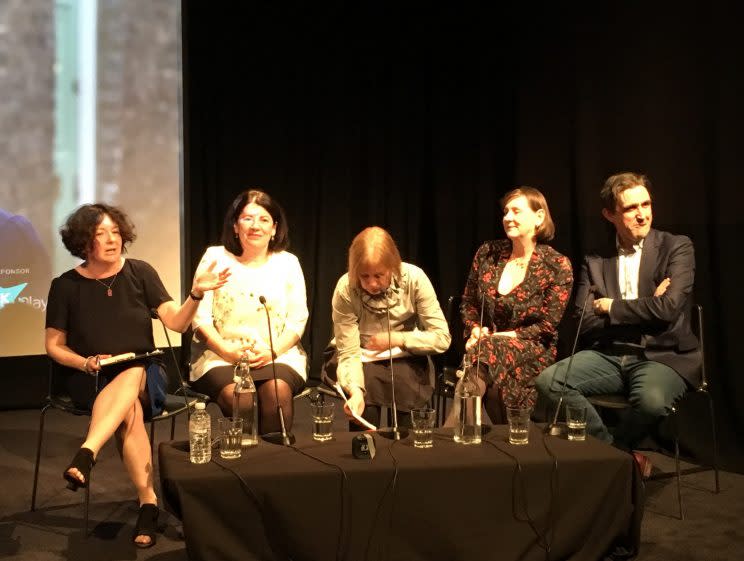Call The Midwife: The origins of the hit British drama


At the BFI/Radio Times festival recently, Call the Midwife (which won the Best Period Drama category in the opening vote) was voted Best Drama of the 21st Century, beating The Night Manager (Contemporary), Merlin (Sci-fi), The Bridge (Foreign Language), The West Wing (US) and Happy Valley (Crime).
We found out the origins of this warm yet hard hitting slice of true-to-life storytelling at the panel discussion held earlier in the weekend, hosted by Radio 4’s Jane Garvey (left) with (l-r) executive producer Dame Pippa Harris, producer Ann Tricklebank, creator & writer Heidi Thomas and actor Stephen McGann (Dr.Turner).
How did they come up with the idea?
Sent the memoirs by author Jennifer Worth, Pippa, Ann and Heidi batted a few ideas about, eventually deciding against a film and heading for television, and the BBC. It took four years to get off the ground – not a long time in this world.
“Reading the book, I thought “I might be able to do something with this”. There was a heart and soul to the material.” – Heidi.

Covering the grubby, gruesome business end of childbirth, it’s an awful lot of gynaecology to present and the panel expressed surprised at the 8pm Sunday evening slot. But this important, sensitive content gets the biggest audience, with a wide demographic watching and talking about it.
“We’re all adults, we can cope with a lot more than the suits think we can.”
So where to begin?
Heidi’s research through archive and interviews is impeccable – and what she writes goes out on the telly; the Beeb doesn’t interfere. The team sought people with contemporary knowledge and then dug in the past for people alive at that time.

Many of the characters were Jennifer’s creations, but from series 3 they’re pretty much fictional, blended with elements of real people. Dr Turner is completely fictional. There’s a smidgen of the real Jenny in there – she was actually only in Poplar for 6 months.
“I knew that I would want to watch it. Watching Twitter being made to care about other people making other people’s lives better.” – Pippa.
Fusing fact into fiction:
The production team were aware it could become too saccharine, too cosy and trite. So there were no holds barred when it came to traumatic storylines that reflected the issues of the era – with some still resonating today.
“Every day I go to bed wiser but also sadder. The nuns were not liberal but they’were not judgmental. The place they were in determined how and why they treated people with respect.”- Heidi
The Thalidomide storyline made those involved in the show realise what they achieved. “We made visible a generation of children who’d become invisible.” The family of Susan Mullacks with be on a journey for a long time as the series continues to follow her story.

They all learned a great deal when dealing with FGM (Female Genital Mutilation).
“We take people behind doors that have not been open to them before … delicate balance between being informative whilst acknowledging that it’s normal in some cultures … Painting a richer picture, not making any judgements.”
A wonderful midwife called Terri advised during the forceps delivery – she was underneath the table, and grabbed the forceps, pulling “like Billy-ho” according to McGann. It’s an “incredible, feral, enlightening world, full of physicality” and he was given carte blanche to get his foot up against the table and give it everything he had to make it as realistic as possible.

Then we had the physical comedy of Nurse Barbara trying out her diaphragm.
Says Heidi: “We strive for a balance between light and shade and knew Barbara had a physicality that would work. We had to have a good and bad side to contraception. Women had children they didn’t want. We’re blessed to be born when we were – young people have no idea how much they take for granted.”
As in, when the pill was introduced in 1961, your GP couldn’t prescribe it unless you could prove you were getting married. It took until 1967 for the pill to be available to all and even then, GPs were slow to embrace it. So it fell to family planning clinics in 1974 to truly make it universally available to single women. And those dangerous back street abortions were finally no longer needed.
“Our job is to entertain and tell stories but we also want to support the people we tell stories about.”
And they do so through the eyes of characters we can all empathise with.
Are we near the end of the Call The Midwife journey?
Thankfully, that’s a big fat NO. There are three more series already commissioned and with the story moving on one year at a time, there’s lots of freedom for characters to leave and return – and having babies isn’t going out of fashion anytime soon, is it?
“You never become immune to stories about people you care about.”

 Yahoo News
Yahoo News 


